On May the 12th 2004, Swedish parliament members Cecilia Wigstrom from the Swedish People’s Party, Goran Lindblad from the Conservative Party, Karin Thorborg from the Labour Party, Ingegerd Saarinen from the Environmental Protection Party and Rosita Runegrund from the Christian Democratic Party jointly held a seminar in Parliament on human rights in China. This seminar aroused great interest from members of parliament, the media and human rights organisations, as well as the persecuted groups in China. This is the first time that a seminar on Human Rights in China was jointly held by MPs from five parties in Sweden .
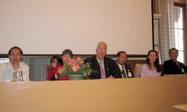 | 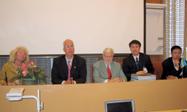 |
Background
Respecting human rights is a necessary and essential prerequisite for a stable and open society. China’s entry into world trade is positive, but it must go hand in hand with the development of human rights. Otherwise, there is a risk that China, through diplomatic and economic pressure, will export their violation of human rights to foreign countries. Sweden has recently increased both trade and other forms of cooperation and exchange with China. We should not forget that the persecution of Falun Gong practitioners, Tibetans, Christians and other dissident groups still goes on. The purpose of this seminar is to provide parliament members with a true picture of the present situation regarding human rights in China from different perspectives and to uphold our democratic values under Chinese pressure.
The invited speakers
During the four-hour seminar, distinguished speakers from Sweden, Canada, the USA and Australia discussed the human rights situation in China from different angles.
Mr Maiping Chen from Sweden, writer and General Secretary of PEN in Scandinavia, gave a speech about the media and freedom of speech in China. Mr Maiping mentioned that, as a result of the government’s control of the media, reports from China’s media do not have authenticity. In the past year, China detained and arrested journalists and writers more than any other country in the world. Writers and reporters who dare to speak the truth are in danger of being persecuted in China.
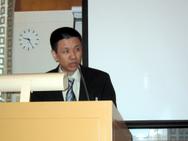 |
Mr. Clive Ansley from Canada, an attorney and Professor who has good experience and knowledge about the Chinese legal system, gave a lecture on the Chinese legal system. He concluded that a Chinese court is not a court because the law is controlled by the power of the Communist Party in China.
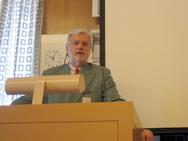 |
Mr. Erping Zhang from the USA, Executive Director of the Association for Asian Research, lectured on the reality of spirituality in China. From the ancient beliefs of Buddhism and Taoism, he came to the persecution of Falun Gong practitioners, Tibetans and Christians for their beliefs in China today. In the view of the Chinese Communist Party’s dictatorship, people’s belief in Buddhas, Daos and Gods is a threat to its political power. Nowadays some religions can exist in China only because they are already under the Chinese Communist Party’s control. Otherwise they are absolutely not allowed. The dictators are just using the successively political movements to achieve the purpose of spiritual control of the Chinese people. The persecution of Falun Gong also stems from this purpose.
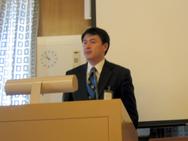 |
Ms. Marina Thorborg from Sweden, a Professor and expert on East Asia at Södertörns University, talked about Chinese history from the perspective of human rights in China. She emphasised that the human rights issue is a very serious one as it has not improved much in reality.
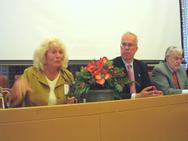 |
Mr Harry Wu, one of the world’s foremost Chinese dissidents, a political prisoner in China for over nineteen years and now the Executive Director of the Laogai Research Foundation, spoke about the most effective ruling and killing tool of the Chinese Government, the Laogai system, which means the 'transform through a forced labour' system. He exposed slave labour in the Laogai centres, making products that are exported from China.
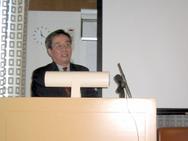 |
Ms Jane Dai and her four-year daughter Fadu from Australia, victims of the persecution of Falun Gong in China, told her story about her family and how her husband was murdered because of his belief in Falun Gong's principles of Truthfulness, Compassion and Tolerance.
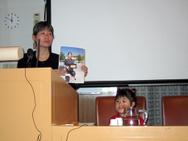 |
The Swedish Falun Dafa Association, the Christian Association and the Tibet Association also talked about the persecution in China.
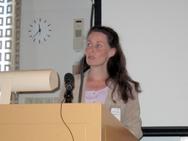 |  | 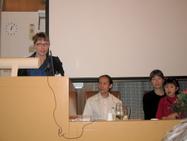 |
Finally, Mr. Jonas Grimheden from Sweden, who is an adviser for the education programme for Chinese judges, prosecutors and police from the Raoul Wallenberg Institute in Lund University, introduced his training programme.
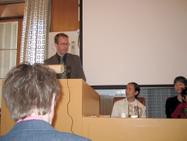 |
The persecution of Falun Gong aroused attention again
Representing the Falun Gong Association in Sweden, Ms. Malin Nordstrand gave a presentation of Falun Gong and the persecution. The contrast between the harmonious and peaceful practice by Falun Gong practitioners who follow Truthfulness-Compassion-Forbearance and the cruel persecution by Jiang Zemin left participants with a deep impression.
Jane Dai followed with a short speech about her family tragedy. She said her husband, father-in-law, sister-in-law and herself had all gained a healthy body and peaceful mind from the practice of Falun Gong. After the persecution started her husband tried to appeal for Falun Gong, but for this he was arrested and later killed at the age of thirty-four. Fadu lost her father when she was only eight months old. Jane’s father-in-law could not stand the sorrow of Falun Gong practitioners being persecuted and his son’s death, and died shortly afterwards. Jane said her family was just one of millions of family tragedies resulting from the persecution of Falun Gong practitioners. While listening to Jane Dai’s story, many participants had tears in their eyes
The economy and human rights
Mr Clive Ansley emphasised that one cannot get justice in China unless it is in favour of the central government's propaganda. The law is used as a ruling tool. Corruption has permeated all areas of Chinese society. He believes foreign investors could risk their reputation and investment if they don’t care about the human rights issue in China.
With his nineteen years of experience as a political prisoner in the Laogai forced labour camp system in China and many years of research, Mr. Harry Wu exposed this illegal system. Laogai has played an important part in the Chinese economy. Prisoners are forced to work as slave labourers there because they had to earn their own food in order to survive. It was good business for the government to keep this Laogai system. He warned that many exported products from China came from those forced labour camps and they could be produced by prisoners including Falun Gong practitioners, Tibetans and Christians.
Sharp criticism of the RWI training programme
The programme from Raoul Wallenberg Institute to train the judges, prosecutors, police and the lawyers from China received sharp criticism from the experts, especially when the advisor for this programme said human rights in China were going in the right direction.
Mr Harry Wu believed that there could not be a positive result on the human rights issue from these kinds of programmes. To get training in Sweden is just like getting a free vacation in Sweden as a reward for doing their job well in China. He pointed at the prosecutors and policeman in the picture exhibition and asked, "Do you want to train these people to be good to prisoners?" It was these people who sentenced Harry Wu to nineteen years in prison.
Jane Dai told of her experience before her husband was killed: ”When my husband was taken away by the police because he appealed for Falun Gong, I looked for a lawyer to defend him. There was no way to do that, as no lawyer dared to take my case. One lawyer said to me that he knew my husband was innocent according to the law of citizen’s rights, but they couldn’t help me because he might lose his job or even get punished if he defended my husband. It was not a solution to teach these people to be fair. They might know very clearly what was right and wrong, but they dared not and could not do anything about it. They had to do what they had to do, no matter how they felt in their hearts. ”
Other experts on China expressed their doubts about the result of the training programme in reality.
Suggestions to the Swedish government on their policy towards China
During the discussion, the experts made some suggestions to the Swedish policy makers on the human rights situation in China. Mr. Maiping Chen asked, “It is quite positive to have the bilateral dialogue with the Chinese Government. However, has the Swedish Government ever had a dialogue with the people who are persecuted and who work very hard on human right in China? It would be very nice to inform the people of what you talked about in the bilateral dialogue and what kind of achievements you have achieved through the dialogue for so many years.” He suggested that the Swedish government should provide some economic resources to support the persecuted groups and people while they spend much money on the training programmes for Chinese judges, prosecutors, police etc.
Mr. Erping Zhang expressed the view that it wouldn’t have too much effect if a government just held dialogues with the Chinese Government behind closed doors. As long as it was not known by the world at large, the Chinese Government would continue violating human rights. He suggested having a resolution on the human rights in China from the Swedish Parliament.
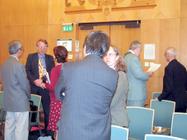 | 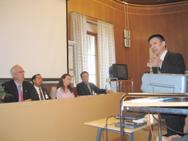 | 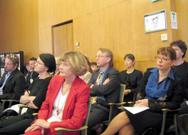 |
The seminar covered a wide range of information about the human rights situation in China. According to responses from the participants, the seminar was very successful and constructive in the work done with China by the parliament and the government. Some international and Swedish media that were present at the seminar interviewed some of the speakers.
* * *
You are welcome to print and circulate all articles published on Clearharmony and their content, but please quote the source.










 more ...
more ...